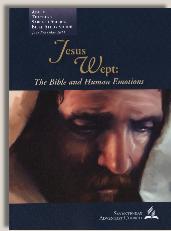|
||||||||||||||
Commentary on "Stress""
Day 5: Wednesday, January 12, 2011 - Jesus' Method to Manage Stress
Overview
The lesson makes the point that Jesus managed His stress by taking time to talk to His Father, to spend time in nature, and to meditate and search the Scriptures (quoted from Desire of Ages, p. 90). It also makes the point that people can be either a source of peace or a source of stress, again quoting Ellen White explaining how Jesus would go to Mary, Martha, and Lazarus when he needed human fellowship. It ends with questions about how one could apply Jesus’ stress-management techniques to one’s own life.
The Teachers’ Quarterly makes the further application that Sabbath-keeping is part of the stress-management package that makes Adventists unique, quoting an excerpt by Josh Dean in Adventure magazine, (June/July 2009). Sabbath-keeping, the quotation concludes, cuts stress out of Adventists’ activities—resulting in extra years of life.
Observations
“Stress” is not a biblical concept. Jesus did not live His life to manage or avoid stress, nor did He adjust His activities to avoid stress. Stress is essentially a physical concern, and Jesus lived not for physical goals but for spiritual ones.
Jesus’ time away from the crowds was not primarily for physical rest. He spent intense time in prayer with His Father, being fed by truth and being open to His Father’s will, being strengthened by His Father’s love and reality so He could go back into the dark, spiritually dead environment of the crowds. The crowds needed life—but they could not have life apart from repentance and recognizing Him as the Source of their rescue.
Jesus’ struggle was not essentially physical, although His body suffered intensely. His struggle was against the spiritual powers of darkness—and Paul emphasizes this fact to believers in Ephesians 6:1-4.
Although the lesson makes the point that Jesus managed stress by time in nature communing with the Father, in reality His praying was grueling and physically taxing. He often spent the entire night in prayer—and although that time was deeply healing and spiritually strengthening, still His praying was intensely demanding. It was not a time of releasing cares and kicking back without demands. Rather, He internalized the demands of the spiritually dead people to whom He was sent, and He prayed for them and for Himself.
The lesson states that people may be either a source of distress or of peace. This fact is the result of people’s spiritual state. Those who are spiritually alive, born of the Spirit, are vehicles of the father’s own love and care, even if they have severe problems of their own. On the other hand, people who are sources of “distress” are those who live “in the flesh”, not surrendering their fears and anxiety to the Lord Jesus, not trusting God for His provision, letting go of their “rights” to their own lives.
Jesus did not live for Himself. Furthermore, He did not live for others. He lived for His Father. He did what the Father told Him to do, and His life was intensely stressful. God never asks us to manage our stress. Rather, He asks us to surrender our fear and our control and to admit we need forgiveness and life.
Sabbath
Finally, the Sabbath is not how we live peaceful lives. To be sure, it may relieve stress temporarily, but stress is physical overload and has nothing to do with spiritual equanimity.
In the new covenant, we receive rest when we receive Jesus. TODAY we can enter His rest (Hebrews 4:7). If we want rest, we are invited to “Come unto Me” (Matt. 11:28).
Sabbath is never required in the new covenant; the Lord Jesus IS our rest, and in Him we have profound rest 24/7—even when our lives are intensely stressed.
Conclusion
- We are never instructed to avoid or relieve stress. Rather, as we do the Father’s will, we will find the difficulty of our lives and situations increasing.
- God disciplines those He loves; those who are not disciplined are not His true sons (Heb. 12:4-11).
- Jesus did not try to avoid or manage stress, and He never taught His followers to manage stress. On the contrary, He promised that He Himself would be a sword that brings distress into the most intimate relationship, dividing even the members of household (Matt. 10:34-36).
- Having peace is different from managing stress. Peace is a spiritual reality, and it is profound and life-altering, occurring even during times of the most intense physical stress.
- Peace is only possible when a person is born from above (Jn. 3:3-6). Only when one admits he needs a Savior and accepts Jesus’ shed blood as the payment for his sin will a person experience peace.
- No amount of time in nature and the avoidance of crowds will yield peace. Stress relief will not yield peace.
- Our true need is spiritual life, the life of Jesus bringing our sinful spirits to life. Jesus’ life will give us peace. Stress is physical, grounded in the material world. It is transient and unavoidable—in fact, stress becomes worse as we submit to the Lord Jesus.
- Relief is not lack of stress; relief is peace with God through the blood of Jesus, the blood of the eternal covenant (Heb. 13:20).
Copyright 2011 BibleStudiesForAdventists.com. All rights reserved. Revised January 10, 2011. This website is published by Life Assurance Ministries, Glendale, Arizona, USA, the publisher of Proclamation! Magazine. Contact email: BibleStudiesForAdventists@gmail.com.
The Sabbath School Bible Study Guide and the corresponding E.G. White Notes are published by Pacific Press Publishing Association, which is owned and operated by the Seventh-day Adventist church. The current quarter's editions are pictured above.
Official Adventist Resources
Standard Edition Study Guide Week 3
Teacher's Edition Study Guide Week 3


